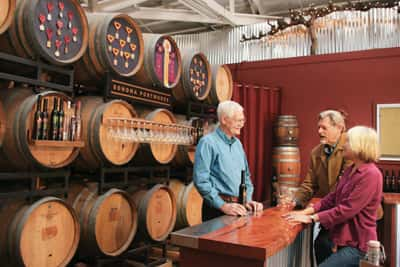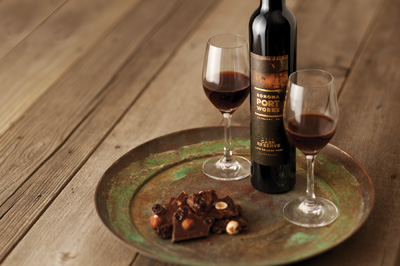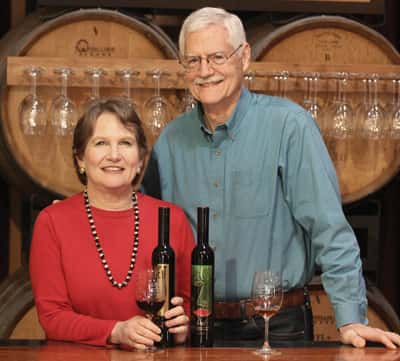Upon entering Sonoma Portworks—neatly situated in the eclectic Foundry Wharf neighborhood on the edge of Petaluma’s west side—one first notices the striking display of awards above the tasting room bar.
There are quite a few of them. And Sonoma Portworks, founded by Bill and Caryn Reading, is as original as it is accomplished. Bill, who previously worked the sales end of the wine industry, successfully merged port and dark chocolate through curious experimentation 25 years ago and started a world-class port business, creating a unique production method and setting trends along the way.
 The Readings no longer seek awards, however. Perhaps there’s no more room to display them. Or, to hear Bill tell it, “We don’t have anything left to prove.” But his dedication in making a wide array of the best port available is evident. “It’s gone from an idea to a passion.”
The Readings no longer seek awards, however. Perhaps there’s no more room to display them. Or, to hear Bill tell it, “We don’t have anything left to prove.” But his dedication in making a wide array of the best port available is evident. “It’s gone from an idea to a passion.”
Largely relying on advice from winemakers he’d met in the industry, Bill gravitated toward port early on, rather than conventional table wine. “I’ve always been a path-less-traveled sort of guy,” he says, adding he thought the world of port was boring and needed new energy. Both Bill and Caryn say being independent helped generate a method and business all their own. “We’re not beholden to anybody else. That’s given us a lot of latitude and flexibility,” says Caryn.
The end result of Bill’s initial experimentation, DECO port, set off a slew of imitators. Sonoma Portworks continued to improvise, expanding its portfolio to offer the largest selection of ports and after-dinner wines in the country. Every vintage is made exclusively with grapes from the Heringer Family Vineyards in Clarksburg, Calif., a sixth-generation business. Bill uses distinctive winegrapes such as Petite Sirah and Petit Verdot, rather than traditional Portuguese port grapes. “I want clean, dark-fruit flavor that’s true to the grape,” he says, adding he strives to balance his port’s sugar and alcohol with flavors from the vine.
 Sonoma Portworks doesn’t use sulfates or commercial yeast, opting for natural fermentation. Its fortifying spirit, the high-alcohol component of port, is aged an average of 10 years, using a unique method that builds on the previous batch with each new barrel. The result is added flavor and complexity. The spirit is added at precisely the correct time; its potency tranquilizes the natural yeast and readies the port for its own barrel, where it ages for as long as 14 years.
Sonoma Portworks doesn’t use sulfates or commercial yeast, opting for natural fermentation. Its fortifying spirit, the high-alcohol component of port, is aged an average of 10 years, using a unique method that builds on the previous batch with each new barrel. The result is added flavor and complexity. The spirit is added at precisely the correct time; its potency tranquilizes the natural yeast and readies the port for its own barrel, where it ages for as long as 14 years.
Before the fortifying spirit is added, Bill uses a foot press, rather than a mechanical press, to extract the remaining juice from crushed grapes within the fermenting must. “A mechanical press will get every drop out. This process doesn’t do that because it’s gentle. It’s not extracting tannins that we don’t want into our port. It’s one of the signature things we do that makes us different,” he says, explaining that many wineries foot crush to initiate the winemaking process, but a foot press influences the final product.
Bill deploys his custom-made press when the alcohol and sugar balance is at a precise level, moving quickly to compensate for an increasing rate of fermentation and prepare the port for aging. “This is about as low tech as you can get, but it’s very effective. Almost everything we do here is by hand. In some cases it’s by foot. All these methods we use to make our ports stand out, we developed ourselves.”
Everything as Sonoma Portworks is done with care, including its wine and food pairings, led by Caryn. The philosophy is to give customers a taste from the vineyard, and the winery goes to great lengths to bring intense flavor—at times performing the essential foot-press process in the middle of the night after waiting for the exact time to act. The precision and steadfastness isn’t practiced with awards in mind, but rather a dedication to craft. “The grapes are in charge of the process,” says Bill. “The only way you can get quality is patience.”





